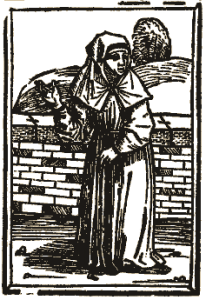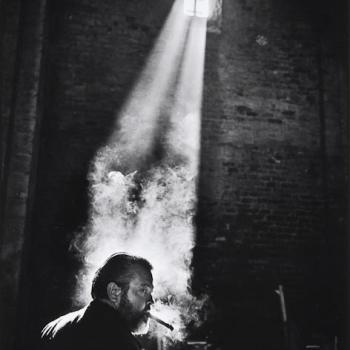
These are the final words in the first vision of Hadewijch of Brabant (fl. early 13th century). After she is whisked up into a heavenly garden and experiences the fruits of divine mystery, God leaves her with these words: “give all, for all is yours!”
Reading this command yesterday (and for the first time), I was struck, struck by the profundity couched in such simple language, overawed by the essential nature of the Lord’s words, hidden beneath of veneer of terseness. This is, of course, how God is wont to work; He communicates with us through the forgotten, the destitute, and the disenfranchised. The prologue to another mystical work, the Flowing Light of the Godhead by Mechthild of Magdeburg (c. 1210- c. 1282), written by a friend of hers, a Dominican named Brother Heinrich, foregrounds this truth. In the somewhat sexist language of his times, he seeks to convince us that these visions should not be ignored just because they come from a lowly one, and what’s more a woman; he reminds us that God worked through Deborah, a prophet and judge of Israel, and Huldah, a seer and adviser to the righteous king Josiah. Not only, he says, should we not overlook such writings because of their humble origins but we should prize them for that very reason:
Quite often, in fact, almighty God has chosen what is weak in the world to confound what is stronger for its good. Therefore let no one wonder or, lacking trust, fall into disbelief if God in the time of grace renews his marvels. He, who in the time of the law of Moses mercifully saw fit to perform similar works, now reveals his mysteries to the fragile sex […] For who shall describe for us more vividly the perfection of the elect than those very ones in whom and through whom God carries out his works? And who could have made known to the church more beneficially or better the perfection of Paul than Paul himself?
We might also be reminded of the words the prophetess Huldah had for King Josiah:
Thus says the LORD, the God of Israel: As for the words you have heard, because you were heartsick and have humbled yourself before the LORD when you heard what I have spoken concerning this place and its inhabitants, that they would become a desolation and a curse; and because you tore your garments and wept before me, I in turn have heard, oracle of the LORD. I will therefore gather you to your ancestors; you shall go to your grave in peace, and your eyes shall not see all the evil I am about to bring upon this place. (2 Kings 22:18-20)
And so, we should not be surprised to find such wisdom expressed so tersely; God rewards those who recognize the holiness of his most humble servants. In truth, the very act of reading the words of a humble medieval mystic invite us to reflect on the divine’s love for the forgotten.
What then are we to make of Mechthild’s striking command?
I would start with the end of what the Lord says: “for all is yours.” This is to say that all is a gift; everything in our world, from the world within which we dwell, to our own bodies, thoughts, and sensations, is a gift, freely dispensed by the godhead. Here I am reminded of a passage from Aquinas’ Summa, in which he defends a starving man’s taking what he needs on the ground that, at bottom, the use of property is common, that is, the world is a gift to all:
Things which are of human right cannot derogate from natural right or Divine right. Now according to the natural order established by Divine Providence, inferior things are ordained for the purpose of succoring man’s needs by their means. Wherefore the division and appropriation of things which are based on human law, do not preclude the fact that man’s needs have to be remedied by means of these very things. Hence whatever certain people have in superabundance is due, by natural law, to the purpose of succoring the poor. For this reason Ambrose says, and his words are embodied in the Decretals (Dist. xlvii, can. Sicut ii): “It is the hungry man’s bread that you withhold, the naked man’s cloak that you store away, the money that you bury in the earth is the price of the poor man’s ransom and freedom.”
All things are radically and unconditionally given to us, in all of our unworthiness, so that we may steward them for right use.
The question then arises: what is right use? Taking a hint from Ambrose, we might say that the right use of gift is giving, that is we must lovingly dispense with, and empty ourselves of, the gifts allotted us. Christ gave Himself for us and so we give ourselves for Christ; God gave us the world and so we give the world up for Him.
Again, we might look to Hadewijch for help. In her third vision, God tells her:
With regard to all things know what I, Love, am in them. And when you fully bring me yourself, as pure humanity in myself, through all the ways of perfect Love, you shall have fruition of me as the Love who I am. Until that day, you shall love what I, Love, am. And then you will be love, as I am Love. And you shall not live less than what I, Love, am, from that day until the death that will make you alive […] Go forth and live what I am: and return bringing me full divinity, and have fruition of me as who I am.
We must recognize God’s love, Himself, in His manifold creation; we must give ourselves up for the sake not only of worldly others but also for God. In fact, we give ourselves to them precisely because we love Him. His total emptying of self is the path that draws us back to Him. In other words, we as extensions of and participants in the divine gift, must return ourselves to the divine giver. Only because all has been presented to us, do we have the possibility to give it back; only because the Lord loves us and all things do we have the ability to love Him and His creation in turn.













